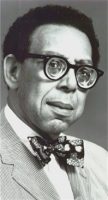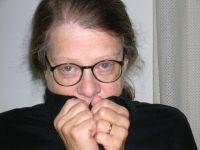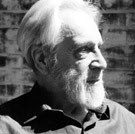August 4, 2016
Edited by David Sanders
Specimen Days
1792— Percy Bysshe Shelley, England, romantic poet (Adonais), is born.
1913— Robert Hayden, American poet (d. 1980), is born.
1934— Rutger Kopland, [Rutger van den Hoofdakker], Dutch poet, is born.
1958— Allison Hedge Coke, American poet and writer, is born.
1991— Nikiforos Vrettakos, Greek poet (Hodyne), dies at 80.

Today as the news from Selma and Saigon
poisons the air like fallout,
I come again to see
the serene, great picture that I love.
Here space and time exist in light
the eye like the eye of faith believes.
The seen, the known
dissolve in iridescence, become
illusive flesh of light
that was not, was, forever is.
—from “Monet's Waterlilies” by Robert Hayden (1913-1980)
“Today as the news from Selma and Saigon / poisons the air like fallout, / I come again to see / the serene”—Robert Hayden
World Poetry
Bahrain Arrests 'political poet' Amid Free Speech Crackdown

Bahrain has extended its crackdown on freedom of speech with the detention of a well-known poet for “political poetry”, to the dismay of campaigners who say the country is making criminals of anyone who criticises the government’s repressive policies. The arrest this week of poet Khalil al-Ismael, who is famous for criticising the Gulf kingdom’s human rights record, came after the charging of Nazeeha Saeed, a journalist, which Human Rights Watch said proved the Bahraini government was undermining freedom of expression and media freedom.
Bahrain has extended its crackdown on freedom of speech with the detention of poet Khalil al-Ismael for “political poetry.”
Recent Reviews
Anthony Hecht’s Nobility
by William H. Pritchard
Three years ago Jonathan Post published a generous selection of Anthony Hecht’s letters, with useful editorial comment; now he has followed up with 300 pages of first-rate criticism of Hecht’s poetry.[1] Although the official biography by David Yezzi is in progress, readers of this marvelous poet should feel that as an enlightening guide to Hecht they couldn’t be in better hands than Post’s. Hecht had already been, in 1999, the beneficiary of published conversation with Philip Hoy, a conversation in which Hecht proved himself willing to go deep into both his personal life and the corpus of poems that issued from it. His intelligent candor about both life and work helped make more available the densely expressive language that characterized him as a poet. It takes time to get used to such density, and Post has been exemplary in guiding us to fuller understanding.
If I’m Scared We Can’t Win: Penguin Modern Poets One review – a welcome return
by Nicholas Lezard
Getting people to read good contemporary poetry is never easy, but in 1962 Penguin cracked it with their Modern Poets series. Each slimmish volume featured a representative selection from three poets; there were two series (1962-75, 1995-97), and No 10 – 1967’s The Mersey Sound, featuring Roger McGough, Adrian Henri and Brian Patten – sold 500,000 copies. And now, after a two-decade gap, we have a new series. The first thing to note is that this initial volume wholly consists of work by women. Good. By my calculations, to reach gender parity, Penguin would have to put only one male poet in the next 27 volumes.
Black Sails, Black Cadillacs
by Edwina Attlee
The saddest story I knew when I was small was that of Theseus who fought the minotaur. He had promised his father Aegeus to sail back to him with white sails if he had been victorious. But in the heat of victory, or another strong emotion, he forgot to change them. His father, seeing the black sails from a distance, killed himself in sorrow. Luke Kennard’s CAIN reads like a slow motion expanded edition (with director’s commentary) of that sad tale. Ostensibly a book in which Cain (of Bible fame) helps the author out with his divorce, it’s an account of the many shapes and sizes of regret.
C.D. Wright's The Poet, the Lion, Talking Pictures, El Farolito, a Wedding in St. Roch, the Big Box Store, the Warp in the Mirror, Spring, Midnights, Fire & All and ShallCross
by Ariana Reines
I saw C.D. Wright at a party once. I wasn't her friend or her student. She was beautiful and graceful; something girlish about her face under the white hair. Out of shyness, and the voluptuous pleasure shyness sometimes brings, I said nothing to her, which makes writing this now feel a little creepy but space limitations prevent me from tarrying further on reasons why. Wright died suddenly, and peacefully, on January 12, 2016. She was an absolute poet, the author of seventeen books, a Guggenheim and MacArthur fellow, a beloved teacher at Brown, a visitor of prisons and a traveler, a comrade of and collaborator with artists, a wife and mother, a mistress of a legend, a survivor of legend, a legend herself.
Penguin’s Modern Poets series is making a welcome return.
Broadsides
Encrypted
Translators confront the supreme enigma of Stéphane Mallarmé’s poetry.
by Alex Ross
At the dawn of modernism, in the late nineteenth century, the activity of avant-garde artists often resembled rival expeditions into uncharted polar regions. The goal was to discover novel spheres of expression: the unspoken word, the unpainted image, the unheard sound. Arguably, the Amundsen of fin-de-siècle art—the first to plant a flag at an outer extreme of artistic possibility—was the French poet Stéphane Mallarmé. Upon his death, in 1898, he left behind a body of work so inscrutable that it still causes literature students to fall to their knees in despair.
The Uneasy Verse of Stevie Smith
By Cynthia Zarin
Two books have haunted me since childhood. I read them both early, at nine or ten, in the summer in a tiny public library on Cape Cod, above the town hall, where my mother deposited me, often with my little sister, while she did errands. The books smelled of damp, and there was sand in the bindings.
Stéphane Mallarmé’s body of work is so inscrutable that it still causes literature students to fall to their knees in despair.
Drafts & Fragments
Artificial Intelligences Are Writing Poetry for a New Online Literary Magazine
by Thom Leavy
While they're practicing word processing over calligraphy, it's easy to think of CuratedAI's algorithmic poets being, in a sense, a quill with no writer. There are innumerable blogs dedicated to posting prose and poetry. CuratedAI, however, is a collection of machine generated creative writing that launched last week. The poems and prose come from multiple different artificial intelligence programs selected by human beings. If the Turing Test is a (debatably) subjective way to measure a machine's passable humanity, then poetry is the subjective cheat sheet.
Carol Ann Duffy Has Written A Poem Celebrating Gas Meters
by Katie Grant
When it comes to poems of serious reflection to lament the dead, the demise of the humble gas meter might not typically be considered the most deserving of subjects. Nevertheless, the Poet Laureate Carol Ann Duffy has composed an elegy to gas and electricity meters, in what might be a world first.
CuratedAI is a collection of machine generated creative writing that launched last week.
Poetry In the News
The Poet Kevin Young Is Named New Director of Schomburg Center

The poet and scholar Kevin Young has been named director of the Schomburg Center for Research in Black Culture in Harlem, a division of the New York Public Library and a leading repository for archival materials relating to African and African-American life, history and culture.
The poet and scholar Kevin Young has been named director of the Schomburg Center for Research in Black Culture in Harlem.
New Books
Everything We Always Knew Was True by James Galvin
[Paperback] Copper Canyon Press, 72 pp., $16.00

In his first collection in seven years, James Galvin expands upon his signature spare and gnomic lyric as he engages restrained astonishment, desire, and loss in a confessional voice. Whether considering masterpieces of painting or describing the austere landscape of his native Wyoming ranchlands, Galvin turns to highly imagistic yet intimate narratives to rain down compassion within isolation.
Mr. West by Sarah Blake
[Paperback] Wesleyan, 128 pp., $15.95
Mr. West covers the main events in superstar Kanye West’s life while also following the poet on her year spent researching, writing, and pregnant. The book explores how we are drawn to celebrities—to their portrayal in the media—and how we sometimes find great private meaning in another person’s public story, even across lines of gender and race. Blake’s aesthetics take her work from prose poems to lineated free verse to tightly wound lyrics to improbably successful sestinas. The poems fully engage pop culture as a strange, complicated presence that is revealing of America itself. This is a daring debut collection and a groundbreaking work.
Partly: New and Selected Poems, 2001-2015 by Rae Armantrout
[Hardcover] Wesleyan, 252 pp., $28.00
Rae Armantrout’s poetry comprises one of the most refined and visionary bodies of work written over the last forty years. These potent, compact meditations on our complicated times reveal her observant sensibility, lively intellect, and emotional complexity. This generous volume charts the evolution of Armantrout’s mature, stylistically distinct work. In addition to 25 new poems, there are selections from her books Up To Speed, Next Life, the Pulitzer Prize and National Book Critics Circle Award winning volume Versed, Money Shot, Just Saying, and Itself. Including some of her most brilliant pieces, Partly affirms Armantrout’s reputation as one of our sharpest and most innovative writers.
Collected Poems by Marie Ponsot
[Hardcover] Knopf, 496 pp., $35.00
Marie Ponsot’s Collected Poems is the stunning lifework of the prizewinning poet, gathered in one volume: the world she has made of life’s fire for sixty years. The present celebratory volume covers nearly all of her published work, from True Minds (1956), which was number five in the famous City Lights Pocket Poets series, through the 2009 Easy, her most recent collection; it also includes some new work, written in the years since. Here is the lyrical joy, the full range of Ponsot’s gift for constructing the pleasures and pains of a riddle that the music and wit of her language solve just in the nick of time, in the “hand-span skill” that is the poem. In examining the powerful life of women, her poetry is as practical as it is profound. “Go to a wedding / as to a funeral,” she advises us. “Bury the loss.” (And adds: “Go to a funeral / as to a wedding: / marry the loss.”) Notable in this collection is the astonishing accomplishment of Ponsot’s sonnets: the traditional form in varieties we’ve never seen in one book before. Open these pages anywhere to experience “language as the primitive dialect of our human race,” as she has described it—to gradually enter a state that is “what poetry hopes of us and for us: enraptured attention.”
Infinite Altars: Poems by James Brasfield
[Paperback] Louisiana State University Press, 92 pp., $17.95
In his second poetry collection, Infinite Altars, James Brasfield tracks restless interplays of light on a fallen feather outside an Italian chapel, the surface of the Gowanus Canal, and a forest footpath after an evening of rain. Atmospheric and reflective, these poems travel with equal ease through the world of fine arts and the places where we live, highlighting the vivid sights and sounds of each in turn. At a sudden encounter with everyday beauty, serenity suffuses through the author: "Something of that calmness goes with us / back into the world." Brasfield's poems invite readers to embrace these unexpected and arresting experiences.
In his first collection in seven years, James Galvin expands upon his signature spare and gnomic lyric.
Correspondences
VIDA Reads with Writers — Mary Jo Bang!
What are you reading on the subway or in the waiting room today?
Sadly, there are no subways in St. Louis but there are countless waiting rooms and in those I’ve been reading the galleys of a book that will be available in October.
An Interview with Marianne Boruch: Trapdoors to an Inner Outer Space
by Mark Danowsky

Marianne Boruch is the author of eight poetry collections, most recently Cadaver, Speak, and The Book of Hours, a Kingsley-Tufts Poetry Award winner, both from Copper Canyon Press. Her ninth book, Eventually One Dreams the Real Thing, is due out from CCP this July.
California Poet Laureate Dana Gioia on Traveling and Making Poetry Accessible to Everyone
by Nathan Solis
Dana Gioia, the California Poet Laureate, spoke with me over the phone while he was on the road traveling in the midst of a speaking tour. We had spotty reception, so our conversation was joined by the pop and snap of rural mobile issues. We picked up again and spoke for another 30 mins on traveling, maturing as a writer and finding himself after the death of his infant son. Gioia’s time as the chairman for the National Endowment of the Arts saw him creating three programs: Poetry Out Loud, Shakespeare in American Communities and Operation: Homecoming.
Envoi: Editor’s Notes

William Pritchard's review above of A Thickness of Particulars by Jonathan Post does what any positive book review should do, especially one concerning secondary material. First, it makes me want to read the book, and two, it takes me back to the primary material. In this case the poetry of Anthony Hecht.
One poem that Pritchard mentions for its baroque elegance is "The Venetian Vespers," a favorite of mine despite my difficulty in understanding it fully. Here is a recording of Hecht reading "The Venetian Vespers" at the Library of Congress.